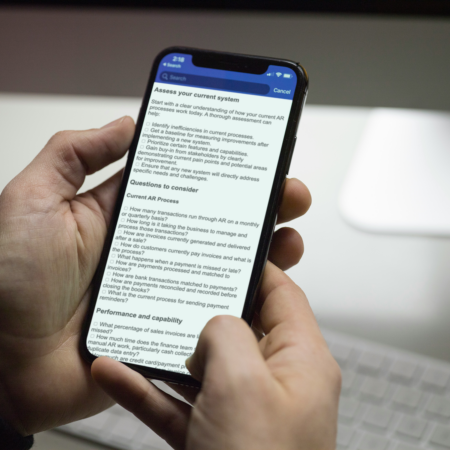
If you have international interests, resources, or business plans, international accounting standards (IAS) will come into play. This usually requires adapting your processes and software around these set practices. Let’s examine how your accounting software should help you meet each international accounting standard.
Newsletter sign up
"*" indicates required fields
What are the International Accounting Standards (IAS)?
The international accounting standards are a set of practices established by the International Accounting Standards Board (IASB). These practices are designed to make it simpler for businesses around the world to compare financial reporting and data. This also helps create transparency and trust in the accounting process, particularly with investment and global trade.
Having an international accounting standard also alleviates compliance pressures and can significantly reduce costs surrounding reporting. In particular, companies that have international operations and subsidiaries in different countries can streamline reporting and practices.
It is important to know though, that IAS has been replaced by the newer International Financial Reporting Standards (IFRS).
What are International Financial Reporting Standards (IFRS)?
The IFRS replaced the original international accounting standards to establish even more consistency with a focus on financial record keeping. The IFRS standards outline effective methods for the following:
- Maintaining transactional data
- Defining types of transactions
- Financial reporting
- Proper record-keeping
- Assessing financial impacts
Requirements for specific accounting functions include those for:
- Statement of Comprehensive Income
- Changes in Equity Statement
- Statement of Cash Flow
- And more
As with the original standards, the goal is to ensure accounting transparency and encourage effective practices. However, the IFRS is not universal. For example, the US relies on Generally Accepted Accounting Principles (GAAP).
Are they Required?
For several countries, including nations in the European Union (EU), the IFRS is required as international accounting standards. If you do business with nations that follow these standards, your financial reporting must conform. While this sounds like a challenge, accounting software removes a significant chunk of the burden away.
Is there IFRS Compliant Software?
IFRS compliance applies primarily to human processes, the methods for financial reporting. As with many compliance regulations, there is no software that is certified as IFRS compliant. Software is either equipped with features and tools capable of meeting the IFRS standards or they aren’t. What matters is how you can use the technology and whether it is able to be configured.
Here are some core qualities to look for in IFRS-capable accounting software.
Flexibility
Flexible IT structure is critical. In particular with report generation and calculations. To meet compliance requirements, your solution should be adjustable to individual needs. For maximum effect and cost-efficiency, your accounting system should be easily configurable right out-of-the-box. This lets you easily meet international accounting standards such as IFRS, and also local and federal regulations.
In-Depth Reporting
Obviously, detail-oriented financial reporting is a quintessential feature to meet IFRS. Prioritize accounting software that uses both traditional out-of-the box reports and custom reporting capabilities. This gives you more options for how you allocate, analyze, and present the financial data. This is important for reporting the exact way IFRS dictates. Once the report parameters are set, the reporting process is as easy as a click. Specifically the IFRS has guidelines surrounding the following:
- Statement of Financial Position (Balance Sheet)
- Profit and Loss Statements and/or Statement of Comprehensive Income
- Statement of Changes in Equity
- Cash Flow Report
Be sure your accounting solution is equipped with these reports and are able to conform to the individual standards.
Automation
Automation is valuable for all levels of accounting. You can do billing, expenses, and even revenue recognition with just a button click. You can also schedule accounting jobs to be done on their own, including reports. When it comes to IFRS, automating internal controls will ensure process and reporting standards are met. Not every accounting solution has high-level automation available; these features make compliance simpler and more accurate. Accounting Seed’s automated internal control capabilities are right out-of-the-box. You can fully customize these rules to be IFRS compliant and more.
Europe, the Middle East and Africa (EMEA) Compatible
Ensure your accounting system can reliably work with international standards and protocols. If the product has EMEA customers, it’s a strong indicator of the range and flexibility for international accounting standards. The software may also be equipped to manage more specialized accounting and tax requirements like Making Tax Digital (MTD).
Look for customer testimonials and product details on how they operate with foreign requirements. Some products like Accounting Seed have an EMEA office dedicated to addressing European needs. If you’re doing European business and financial reporting, go with a proven accounting tool.
“Now that the key features needed for the EMEA market have been deployed, tested, and used by the current customer base, we [Accounting Seed] are excited to open a London office and dive deeper into the EMEA market,” Tony Zorc, CEO of Accounting Seed. Read the story: Accounting Seed Opens Office in the UK.
Keep up with any International Accounting Standard
Every international accounting standard is open to change, just like how IAS was replaced by IFRS. The one constant you should rely on is your accounting software. Flexibility, automation, reporting, and EMEA readiness are factors that ensure that your solution will adapt to your business needs. Remember, you’re not just investing in your accounting, you’re investing in your future.
Schedule a free demo today to see how Accounting Seed helps you thrive in the EMEA market and beyond.
For more helpful accounting resources, read on:
- Top 7 Issues Accountants Face Today
- Accounting Cybersecurity: How to Keep Financial Data Safe and Secure
- Top 8 Reasons Why IT Implementations Fail
- What is Cash Disbursement in Accounting?
- Accrued Expenses: What Are They And How to Report Them?
- Intro to Accounts Payable and Purchase Order Accounting
- Accounting Debits and Credits: What’s the Difference?
See Accounting Seed in action
Get a close-up view of how accounting on Salesforce can eliminate the need for costly integrations—and silos of mismatched information—by sharing the same database as your CRM.


